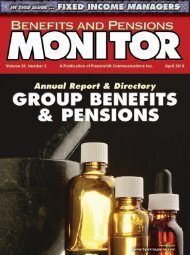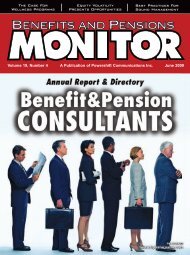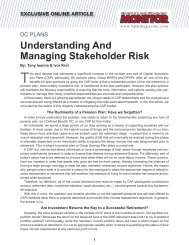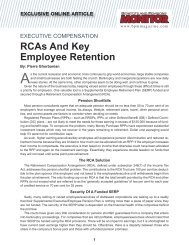BPM October 2010.indd - Benefits and Pensions Monitor
BPM October 2010.indd - Benefits and Pensions Monitor
BPM October 2010.indd - Benefits and Pensions Monitor
Create successful ePaper yourself
Turn your PDF publications into a flip-book with our unique Google optimized e-Paper software.
Multi-nationals Should<br />
Centralize Pension Expertise<br />
Multi-national companies should centralize their<br />
pension expertise to better manage their liabilities,<br />
says PricewaterhouseCoopers (PwC). The recommendation<br />
follows an analysis of pension liabilities<br />
for the 25 companies in the Amsterdam Exchange<br />
index (AEX). It also calls for improving effi ciency<br />
through joint investment policies <strong>and</strong> risk management,<br />
<strong>and</strong> using the benefi ts of scale through collective<br />
international contracts to manage pension<br />
arrangements. It found that company pension funds<br />
had a combined shortfall of $18.1 billion at the<br />
end of 2009 after their sponsors made worldwide<br />
additional contributions of $7.1 billion the previous<br />
year. Since 2004, companies spent less than<br />
50 per cent of their contributions for new pension<br />
accrual <strong>and</strong> a steadily increasing amount to account<br />
for shortfalls.<br />
Aon Hewitt Formed<br />
Aon Hewitt is open for business. The merger between<br />
Aon Corporation <strong>and</strong> Hewitt Associates, Inc. is now<br />
completed. “Through Aon Hewitt, we will provide<br />
our clients with a broader portfolio of innovative<br />
products <strong>and</strong> services focused on what we believe<br />
are two of the most important topics facing today’s<br />
global economy – risk <strong>and</strong> people,” says Greg Case,<br />
president CEO of Aon. The company predicts the<br />
cost savings of the merger will be approximately<br />
$355 across Aon Hewitt in 2013, primarily from<br />
reductions in back offi ce areas, public company<br />
costs, <strong>and</strong> management overlap, as well as leverage<br />
of technology platforms.<br />
Two Speed World<br />
Emerging<br />
Pension plan <strong>and</strong> institutional investors must<br />
come to grips with the “two speed” world of the<br />
developed <strong>and</strong> emerging markets economics,<br />
says Yvan Breton, Canada <strong>and</strong> Latin America<br />
leader at Mercer’s investment consulting business.<br />
Over the past 25 years, the developed world<br />
has driven growth <strong>and</strong> equity prices. Now, however,<br />
growth is slowing <strong>and</strong> most global economic<br />
<strong>Benefits</strong> <strong>and</strong> <strong>Pensions</strong> <strong>Monitor</strong> – <strong>October</strong> 2010<br />
growth is coming from emerging markets, he told<br />
a media session prior to its ‘Americas Investment<br />
Forum.’ Investors need to take advantage of the<br />
“two speed” world <strong>and</strong> reassess the weighting<br />
of emerging markets in their portfolios. “Clients<br />
should really consider rethinking their investment<br />
strategies going forward, <strong>and</strong> pay more attention<br />
to the potential from the east, or emerging economies,”<br />
says Breton.<br />
ESG Moving Into<br />
Mainstream<br />
Mainstream institutional investors are beginning to<br />
incorporate environmental, social <strong>and</strong> governance<br />
(ESG) factors into their decision-making, says a<br />
publication from the Canadian Institute of Chartered<br />
Accountants (CICA). “Institutional investors<br />
tend to have a longer investment time horizon <strong>and</strong><br />
are increasingly showing signs of interest in ESG<br />
factors,” says Lisa French, principal, guidance <strong>and</strong><br />
support, CICA. “These investors are expressing<br />
their expectations for corporate disclosures beyond<br />
what is currently provided in fi nancial reporting.”<br />
The publication states that regulators have a<br />
responsibility to ensure that material information<br />
needed by capital markets is provided in regulatory<br />
fi lings.<br />
Employers Must Show<br />
Undue Hardship<br />
An employer must show that it cannot accommodate<br />
an employee’s disability without facing<br />
undue hardship or face undue hardship to provide<br />
further accommodation if it wants to terminate<br />
the employee, says Christian Paquette, of Heenan<br />
Blaikie. Speaking at its ‘Managing Disability in<br />
the Workplace’ seminar, he said this may involve<br />
looking at the cost to accommodate, health <strong>and</strong><br />
safety issues, <strong>and</strong> even the impact on employee<br />
morale. The threshold to accommodate will also<br />
vary based on the resources of the employer. The<br />
duty to accommodate only requires the employer<br />
to provide a reasonable, not a perfect, accommodation.<br />
As well, the employer is not required to create<br />
a position to accommodate an employee. ■<br />
NEWS<br />
11









